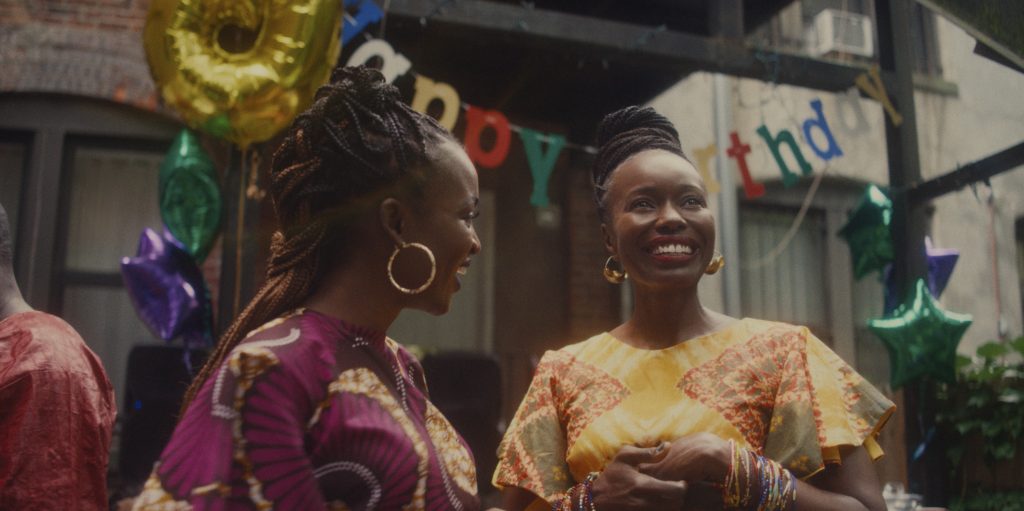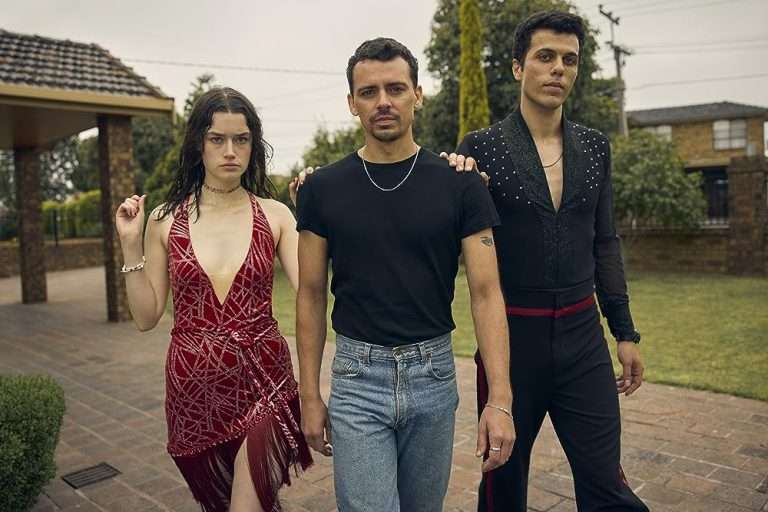Nanny (2022) Explained: Waves gush over a sleeping Aisha’s face, and a spider crawls over her cheek as darkness looms large; until she wakes up in Nikyatu Jusu’s “Nanny.” The Grand Jury Prize winner at this year’s Sundance Film Festival looks pretty simple from the surface, about an African immigrant chasing her American Dream. Still, the ocean underneath is much deeper here. Water keeps coming back in many forms, like a recurring dream, as we see Aisha navigating through white privilege and a capitalist society toward her goal.
In a year that should already be considered a revelation for the horror genre, be it the very in-your-face bait-and-switch approach of “Barbarian” or the casually placed jump scares of “Smile” or the exploration of a proper, narrative-focused origin story of “Terrifier 2”; Jusu’s “Nanny” emerges as another triumph. While it could have been a noble but pretty much one-dimensional, atmospheric tale of oppression and exploitation of a less fortunate woman in Modern day America, Jusu’s ambitious maneuvering of bringing magic realism into the foray and mixing that up with West African horror folklores has taken “Nanny” to a whole other level.
Nanny (2022) Plot summary and Movie Synopsis

In NYC, undocumented Senegalese immigrant Aisha (An amazing Anna Diop in her first leading role) gets hired as a nanny by upper East side couple Amy (Michelle Monaghan) and Adam (Morgan Spector) for their five-year-old daughter Rose (Rose Decker). Despite the generally warm welcome Aisha receives from Amy, there is a sense of awkwardness between the two.
Aisha has been living in the US for almost a year now, and all she wants is to bring her son Lamine (Jahleel Kamara) into the country after finding a bit of financial stability. Working vigorously for days and, more often than not, for nights, Aisha strides towards the one thing that she wants. But her path is not as easy as it seems, as soon she starts to discover the glaring cracks in her employers. Amy, an absent mother and a victim of workplace sexism, keeps forgetting to pay Aisha for her extra hours and her dues keep piling up. An understandably frustrated Aisha tries to seek help from the man of the house regarding the matter, but while Adam comes off as a generally charming presence, he doesn’t seem to be much of a help either. Though with Rose, Aisha develops a very motherly bonding.
Outside the mundane of her workplace, Aisha’s life becomes brighter as she starts dating Malik (Sinqua Walls), the doorman of the couple’s building. The relationship strengthens further as Malik, also a single father, genuinely sympathizes with Aisha for being away from her child for a “lifetime.”
Mami Wata and Anansi Spider
Throughout the entire narrative of “Nanny,” these two West African horror folklores keep coming back, both literally and metaphorically. The first time Aisha meets Malik’s enigmatic grandmother Kathleen (played by the legendary Leslie Uggams), Mami Wata is mentioned by Kathleen as this mermaid-like spirit symbolizing sexuality, fertility, and money. On the other hand, Adam gives the Anansi Spider book to his daughter, which Aisha reads to Rose as a bedtime story. Both the spider and Mami Wata are described as figures of oppressed people’s resistance against an established order. And their mode of operation is usually chaos and unpredictability.
Right from the very first scene of the movie, Aisha finds herself around water, inside of it, clearly the doings of the mermaid. And we see the shadow of a spider keep manifesting on the walls of her room in the apartment while Rose keeps talking about seeing Anansi. As we get repeated visuals of the mermaid and the snake that is usually associated with her, the line between the real world and the world of lores keeps getting blurrier; both for Aisha as well as the audience.
The significance of it
“What do they want from me?”
That is what Aisha asks Kathleen in a pivotal scene of the movie. Kathleen, who was cleverly established as a psychic in an earlier scene, suggests Aisha replace the “from” in the question with a “for,”; which changes the entire dynamic of the movie. Instead of having Anansi and Mami Wata as obstacles, the director transforms them into supporting forces despite all the erratic activities.
Amy and Adam in this movie are the flag bearer of oppression and white privilege despite how nice they try to pass themselves off. Of course, as the movie progresses, Amy’s formal layer of niceness toward Aisha wears off, and her insecurities about her daughter having a more motherly bond with the nanny take over. Her fear is actually legit, though, as Aisha (or Mami Wata) does challenge the order by getting closer to Rose. Another noticeable aspect is the easygoing relationship between Aisha and Adam despite all the financial woes. After Adam pays some of Aisha’s money, we see Aisha hugging Adam and then Adam instinctively kissing Aisha; and getting bitten. He had that coming, though, as he says, looking embarrassed and all flustered. Mami Wata, as mentioned by Kathleen, can’t be ruled by humans after all.
Nanny (2022) Ending, Explained
Aisha’s dream of getting Lamine to the US never gets fulfilled as Lamine never makes it there, unsurprisingly. But Aisha’s story doesn’t end with that, as we see the Mermaid lifting up a drowning Aisha from the water, almost like a phoenix from the ashes. Aisha does find her happy ending with Malik and a newborn baby. Mami Wata does fulfill the promise of fertility, even after wreaking havoc with tragedy.
Of motherhood and guilt
Throughout the movie, the subject of motherhood and the fear of failing their own child hovered upon the female characters. While Aisha is doing everything to bring her son to US soil, she keeps struggling with the guilt of being away from him and having any semblance of happiness in her life. Her strong bonding with Rose further intensifies it. Kathleen, who has lost her child to mental illness but managed to forgive herself, becomes Aisha’s inspiration for getting over her guilt.
In stark contrast to Aisha and Kathleen, where both of the women are genuine victims of a system that is rigged with capitalism and racism, Amy’s justification of not being able to be a good mother to Rose is not sympathized by the movie. This is Aisha’s story, of course, as we don’t really get to know what happens to Amy, but in the final scene of the movie, she is not left in a good place.
Does the movie serve as a critique of the American Dream?
Indirectly, yes. The term American Dream has always been defined as an epitome of a great life. In so many forms of art, we have seen people trying to achieve it as some holy grail. While the actual term stands for equal opportunity for everybody and hard work getting the proper due in a capitalist society, the real truth of it seems much different. Especially in the world of today, we can’t ignore the adverse effect of this preset parameter of the good life. The impact it has on the life of millions of immigrants, as well as less privileged American residents, is astonishingly grim.
The movie makes it a point to see through the curtains of the American Dream and shed light on the flaws. Amy and Adam have everything someone like Aisha can possibly dream of. A swanky apartment, substantial money in bank accounts, and a life filled with opaque privileges. Yet, they are doomed in the same world that they own. It is like a serpent biting its own tail. What Aisha, and so many others like her, wish to find is not something people should run after.
Nanny (2022) Review
There is nothing random in “Nanny.” Every shot and every scene seems meticulously crafted with a certain predicament. Yet, the proceedings never seem artificial, and it mostly flows like a river. Nikyatu Jusu’s screenplay is not entirely perfect, though, as, in the final act, things do seem pretty rushed, especially the entire arc of Lamine and the culmination of it. And at times, the use of metaphors and allegorical references becomes way too much to digest. The movie looks very lush and polished, which is probably a creative decision taken together by Jusu and cinematographer Rina Yang. The latter uses a lot of purple and neon, along with warm tones and bright lights, to create a moody yet comforting atmosphere for Aisha.
Anna Diop, who features in almost every single frame, has given the performance of her life in the role of Aisha. Though often wordless, Diop’s silent gazes and facial twitches are enough to draw you in and root for her Superhero against all the odds. There is, in fact, a very well-put Superman reference in the movie.
With Jason Blum boarding the ship as an executive producer, “Nanny” comes with the obvious expectation of a Blumehose chiller. It does tick all the boxes thanks to its well-earned moments of scares. But instead of just being limited to that, it goes well above and beyond by being a human drama filled with enough warmth, as well as a fascinating coming-of-age tale of perseverance.
Related: 10 Classic Horror Movies You Can Watch On Hbo Max Right Now
Nanny Official Trailer
Nanny (2022) Movie Links: IMDb



![Sagara Sangamam [1983] Review – Of art, life and death](https://79468c92.delivery.rocketcdn.me/wp-content/uploads/2018/05/download.png)


![Two Gods [2021] Review: A gracefully handled documentary about a casket maker and his prodigies](https://79468c92.delivery.rocketcdn.me/wp-content/uploads/2021/06/Two-Gods-1-768x432.jpg)